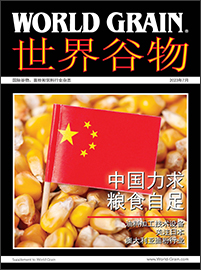KIEL, GERMANY — Long-term loss of Ukrainian grain on the world export market due to Russia’s invasion of the country could have a particularly damaging impact on North Africa, where many countries are dependent on a stable supply of imported cereals to meet food production demand.
Ukraine accounts for about 10% of the world’s wheat and supplies large quantities of grain to North African states, which other sources could not replace even in the long run, according to current model calculations by the Kiel Institute for the World Economy, based in Kiel, Germany.
Hendrik Mahlkow, trade researcher at the institute, and Tobias Heidland, research director for international development and member of the African Research Cluster, used the KITE (Kiel Institute Trade Policy Evaluation) model to simulate the long-term consequences for Africa of an end of exports of Ukrainian wheat and other cereals for food production, such as corn or sorghum. The model calculations did not include cereals used as animal feed, such as corn. Tunisia and Egypt would particularly face difficult situations.
In Tunisia, the country’s total wheat imports would permanently decrease by over 15%, and imports of other cereals would decrease by almost 25%. Egypt would import over 17% less wheat and almost 19% less other cereals, while South Africa would import 7% less wheat and over 16% less other cereals.
Imports of other cereals would also be noticeably lower in Cameroon (down 14 %) and Algeria and Libya (-9.6 %, aggregated in the trade model). Wheat imports would drop significantly in Ethiopia (-9.6 %), Kenya (-7.9 %), Uganda (-7.1 %), Morocco (-6.2 %), and Mozambique (-6 %).
“Ukraine’s central importance to Africa’s food supply is evident from our estimates, especially in countries that consume grains they buy on the world market,” Mahlkow said. “Ukraine is irreplaceable as a grain supplier, even in the long term. Its failure worsens Africa’s supply and also drives up prices.”
If less grain is available, prices will rise, in some cases dramatically. According to the simulation, other cereals would become more than 24% more expensive in the long term in Tunisia, almost 9% in Algeria and Libya, and more than 4% in Egypt. The permanent increase in the price of wheat would be nearly 9% in Kenya, almost 8% in Uganda, 5% in Tunisia, 4% in Mozambique, and over 3% in Egypt.
KITE simulates the long-term and permanent changes in trade flows when conditions change. The short-term consequences for countries and their populations not reflected in the model are likely to cause even greater disruptions, the researchers noted.





